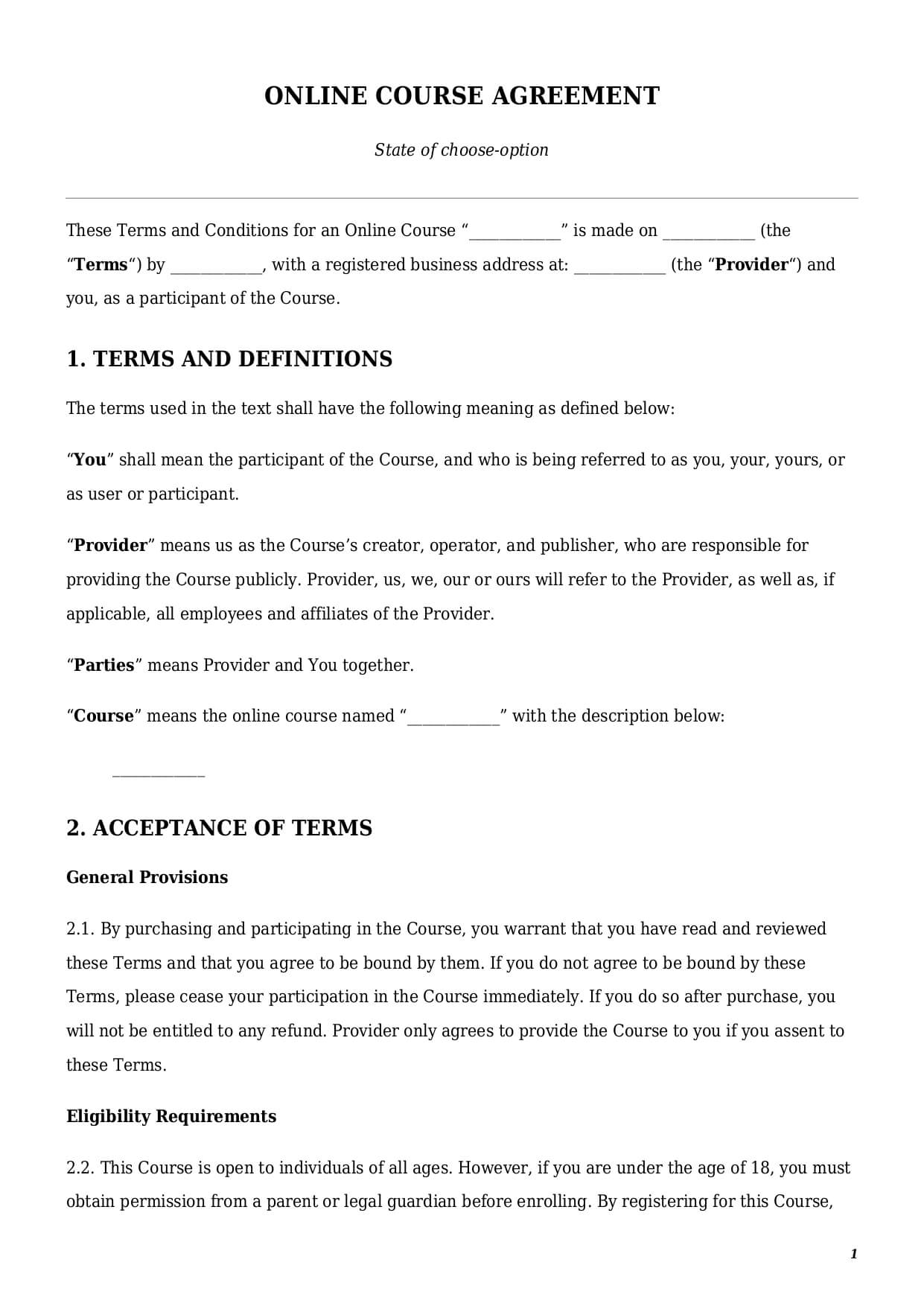Online Course Agreement
Reviews


What is an online course agreement?
An online course agreement is a legal document that outlines the rules, responsibilities, and expectations between the provider of an online course and the participants who enroll in it. This template sets the legal foundation by clearly defining their rights and obligations.
The present online course agreement template could be customized for various types of online courses, including self-paced, instructor-led courses, subscription-based learning, or diploma courses.
While an online course agreement is a typical contract between a course provider and a client or user, it is common to refer to it as terms and conditions. In a ‘traditional’ legal agreement, parties tend to negotiate and discuss provisions of the future contract between each other. However, in the case of the online course terms and conditions template, this is not possible. Basically, a user or client simply “joins” the existing agreement and consents to all its provisions. It is a typical situation for all businesses that sell their services or products to an unlimited number of customers.
A course agreement template shall not be confused with a coaching contract. While both documents may appear similar, they serve different purposes and goals, in particular:
- Parties involved: an online course could join everyone. Coach relations implies a personal level of communication.
- Purpose and goal: online courses offer knowledge and information in a specific field. A coach contract is focused on helping a client to achieve certain goals in business, life, health, etc. All in all, this is a client who defines the scope of actual cooperation.
The parties involved in an online course agreement are the course provider and the user. A user is always an individual who wishes to pursue the course. It is common for some courses to establish additional eligibility requirements a user should be able to meet to access the course, for example
- age restriction (e.g., be at least 18 years of age);
- availability of prior certification, diploma, or experience; or
- have specific equipment or a place to study the course.
How to draft an online course agreement template?
Creating a solid online course agreement template involves the inclusion of essential provisions without which a document cannot become a valid document.
Course Description
Every course agreement shall provide a comprehensive description of the course, including the following details:
- full course’s title;
- purpose;
- duration (if applicable);
- access information for users;
- eligibility requirements (if applicable).
Provider’s Disclaimers and Liability
An online course agreement template shall provide a list of legal disclaimers for a course provider. A disclaimer is a legal clause by which a course provider limits or excludes liability for certain things, actions, or content. In terms and conditions, a course provider may include either of the following disclaimers:
- that the information given in the course is not legal, medical, financial, or accounting advice;
- that a provider is not liable for any result or consequences due to the user’s participation in the course; and
- that a provider is not liable for any advice or other information provided in the course.
Depending on the purpose and content of the course, the list of disclaimers may vary.
Even a simple agreement for online course lays out rules for a provider’s liability. These rules shall define:
- cases when such a liability is excluded completely (e.g., the provider cannot be liable for a user’s inability to connect to a course because of the user not having a laptop);
- cases when a liability cannot be excluded (e.g., gross negligence); and
- liability threshold (e.g., usually a provider’s maximum liability shall be limited to fees paid for the course).
User Obligations
A solid course agreement must include the list of the user’s duties and obligations. Depending on a provider’s choice, a list of a user’s obligations could be either outlined in the text of a course agreement or in a separate code of conduct policy.
The exact list of obligations widely depends on factors like the availability of live sessions where users can participate, the possibility of posting a user’s generated content, etc. If, for example, users may participate in online classes, in that case the list of additional rules on how to behave during online classes shall be included in the terms and conditions.
The list of the user’s obligations could be grouped into three big classes:
- Participation rights (e.g., no digital bullying, no offensive comments);
- Intellectual property rights (e.g., do not distribute course materials with third parties; do not resell or relicense access to the course);
- Usage and access rights (e.g., join live sessions on time; do not resell the course’s content for commercial use).
Payment Terms
If the course is paid, an online course agreement sample shall include the payment structure and course fee:
- type of payment (e.g., one-time fixed fee or recurring payments);
- list of acceptable payment methods;
- list of cases for a full or partial refund;
- procedures for submitting a refund request;
- cancellation policy (may not be available for all courses).
Dispute Resolution
Even a simple agreement for online course should provide how disputes are to be resolved between the parties. A course provider may choose one or several options from the above:
- Amicable resolution of a dispute: Before going to a court or to arbitration, the parties have to attempt to resolve a dispute in good faith. Most course providers tend to make it the first mandatory step in a dispute resolution process.
- Arbitration: The text of an online course agreement shall define the number of arbiters, place of arbitration, and the applicable laws that shall govern the arbitration process.
- Litigation: Parties may initiate a court proceeding at any time or after an amicable resolution has failed.
How to customize a legal document template at Faster Draft?
To get a personalized legal document or terms and conditions, follow a few easy steps below:
- Click the button “Create Document.”
- Answer simple questions in the form.
- Select a document’s format—agreement for online course PDF or Word.
- Make a payment.
- Download, publish, and send this document to the participants of your course.
Table of content

Looking for something Different?
Start typing to find out our collection of legal documents and contract templates
